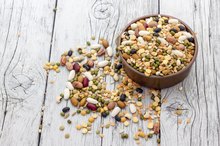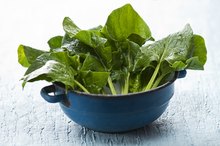What Vitamins or Minerals Are in Artichokes?
Whether you experience culinary delight or intimidation when you see the firm, tightly closed leaves of a fresh artichoke probably depends on if you’ve eaten one. Although the thistlelike bud seems a bit tough, it’s long been considered a delicacy among vegetables -- its edible portions have a complex flavor and a velvety texture. Artichokes are a low-calorie, high-fiber, antioxidant-rich source of several important vitamins and minerals.
Full of Folate
Eating artichokes is one way to boost the amount of folate in your diet. This B vitamin is not only essential to cell reproduction, but along with vitamins B-6 and B-12, it also helps protect against heart disease by regulating your body’s homocysteine levels. A medium-sized globe artichoke delivers almost 30 percent of the daily value for folate; a cup of artichoke hearts supplies closer to 40 percent of the recommended daily value.
Vitamin C
Green Leafy Vegetables High in Potassium
Learn More
Artichokes are an excellent source of vitamin C, provided you go against tradition and eat them raw. In addition to its role as a powerful antioxidant, vitamin C supports healthy skin, good vision, wound healing and iron absorption. A medium-sized raw globe artichoke -- freshly picked tastes best -- supplies about 25 percent of the daily value for vitamin C. Cooked artichokes are nearly 40 percent lower in vitamin C because the water-soluble nutrient is heat-sensitive 2.
- Artichokes are an excellent source of vitamin C, provided you go against tradition and eat them raw.
- A medium-sized raw globe artichoke -- freshly picked tastes best -- supplies about 25 percent of the daily value for vitamin C. Cooked artichokes are nearly 40 percent lower in vitamin C because the water-soluble nutrient is heat-sensitive 2.
Vitamin K
Artichokes are rich in vitamin K, which is sometimes referred to as the “coagulation vitamin” because your blood can’t clot without it. It also plays an important role in bone formation and maintenance. An average-sized globe artichoke -- either raw or cooked -- provides just over 20 percent of the daily value for vitamin K; a cup of artichoke hearts delivers just over 30 percent of the recommended daily value.
Magnesium Supply
Can You Eat Daikon Radish Greens?
Learn More
Magnesium is a major mineral, meaning your body needs relatively large amounts to function normally. This all-important nutrient is vital to bone, muscle, nerve and heart health. It also helps convert carbohydrates, protein and fat into energy. You’ll get just under 20 percent of the daily value for magnesium from a 1-cup serving of artichoke hearts or an average-sized, uncooked globe artichoke. Cooked artichokes are approximately 30 percent lower in magnesium than the raw variety.
- Magnesium is a major mineral, meaning your body needs relatively large amounts to function normally.
Other Nutrients
Including artichokes in your diet will boost your intake of potassium and iron, as well. An average-sized raw globe artichoke or a cup of the tender hearts each supply about 14 percent of the daily value for potassium. The raw vegetable provides nearly 10 percent the daily value for iron, while the cooked variety contains about half that amount. An artichoke’s value goes beyond its vitamin and mineral content, however, as it’s also an excellent source of antioxidant compounds and dietary fiber. According to the U.S. Department of Agriculture, an average-sized cooked artichoke contains more antioxidants than a cup of blueberries, while a cup of artichoke hearts delivers nearly 60 percent of the daily value for fiber.
- Including artichokes in your diet will boost your intake of potassium and iron, as well.
- An artichoke’s value goes beyond its vitamin and mineral content, however, as it’s also an excellent source of antioxidant compounds and dietary fiber.
Related Articles
References
- USDA National Nutrient Database: Artichokes, (Globe or French), Cooked, Boiled, Drained, Without Salt
- USDA National Nutrient Database: Artichokes, (Globe or French), Raw
- California Artichoke Advisory Board: Health and Nutrition
- USDA: Database for the Oxygen Radical Absorbance Capacity (ORAC) of Selected Foods
- New York Times: Eating a Raw Artichoke
- Wellness Foods A to Z: An Indispensable Guide for Health-Conscious Food Lovers; Sheldon Margen, M.D.
- Artichokes, (globe or french), boiled, without salt. FoodData Central. U.S. Department of Agriculture. Published April 1, 2019.
- Crider KS, Qi YP, Devine O, Tinker SC, Berry RJ. Modeling the impact of folic acid fortification and supplementation on red blood cell folate concentrations and predicted neural tube defect risk in the United States: have we reached optimal prevention?. Am J Clin Nutr. 2018;107(6):1027–1034. doi:10.1093/ajcn/nqy065
- Kirkland AE, Sarlo GL, Holton KF. The role of magnesium in neurological disorders. Nutrients. 2018;10(6):730. doi:10.3390/nu10060730
- Negro D, Montesano V, Grieco S, et al. Polyphenol compounds in artichoke plant tissues and varieties. J Food Sci. 2012;77(2):C244-52. doi:10.1111/j.1750-3841.2011.02531.x
- Anderson JW, Baird P, Davis RH, et al. Health benefits of dietary fiber. Nutr Rev. 2009;67(4):188-205. doi:10.1111/j.1753-4887.2009.00189.x
- Burnier M. Should we eat more potassium to better control blood pressure in hypertension?. Nephrol Dial Transplant. 2019;34(2):184-193. doi:10.1093/ndt/gfx340
- Sahebkar A, Pirro M, Banach M, Mikhailidis DP, Atkin SL, Cicero AFG. Lipid-lowering activity of artichoke extracts: A systematic review and meta-analysis. Crit Rev Food Sci Nutr. 2018;58(15):2549-2556. doi:10.1080/10408398.2017.1332572
- Rondanelli M, Monteferrario F, Perna S, Faliva MA, Opizzi A. Health-promoting properties of artichoke in preventing cardiovascular disease by its lipidic and glycemic-reducing action. Monaldi Arch Chest Dis. 2013;80(1):17-26. doi:10.4081/monaldi.2013.87
- Liguori I, Russo G, Curcio F, et al. Oxidative stress, aging, and diseases. Clin Interv Aging. 2018;13:757-772. doi:https://doi.org/10.2147/CIA.S158513
- Carr AC, Maggini S. Vitamin C and immune function. Nutrients. 2017;9(11):1211. doi:10.3390/nu9111211
- D'Antuono I, Carola A, Sena LM, et al. Artichoke polyphenols produce skin anti-age effects by improving endothelial cell integrity and functionality. Molecules. 2018;23(11). doi:10.3390/molecules23112729
- Rodríguez-Olleros Rodríguez C, Díaz Curiel M. Vitamin K and bone health: A review on the effects of vitamin K deficiency and supplementation and the effect of non-Vitamin K antagonist oral anticoagulants on different bone parameters. J Osteoporos. 2019;2019:2069176. doi:10.1155/2019/2069176
- Lattanzio V, Kroon PA, Linsalata V, Candinali A. Globe artichoke: A functional food and source of nutraceutical ingredients. J Funct Foods. 2009;1(2). doi:10.1016/j.jff.2009.01.002
- Mileo AM, Di Venere D, Abbruzzese C, Miccadei S. Long term exposure to polyphenols of artichoke (Cynara scolymus L.) exerts induction of senescence driven growth arrest in the MDA-MB231 human breast cancer cell line. Oxid Med Cell Longev. 2015. doi:10.1155/2015/363827
- Pulito C, Mori F, Sacconi A, et al. Cynara scolymus affects malignant pleural mesothelioma by promoting apoptosis and restraining invasion. Oncotarget. 2015;6(20):18134-50. doi:10.18632/oncotarget.4017
- Grundmann O, Yoon SL. Complementary and alternative medicines in irritable bowel syndrome: An integrative view. World J Gastroenterol. 2014;20(2):346-62. doi:10.3748/wjg.v20.i2.346
- Macchia L, Giliberti L, Lotti A et al. Allergy to pomegranate and artichoke, novel food allergens of the Mediterranean diet. Clin Transl Allergy 2013;3:P75. doi:10.1186/2045-7022-3-S3-P75
- Denisow-Pietrzyk M, Pietrzyk Ł, Denisow B. Asteraceae species as potential environmental factors of allergy. Environ Sci Pollut Res. 2019;26:6290–6300. doi:10.1007/s11356-019-04146-w
- Welland D. Artichokes: A rich history and mild flavor. Food and Nutrition. Updated December 8, 2016.
Writer Bio
Based just outside Chicago, Meg Campbell has worked in the fitness industry since 1997. She’s been writing health-related articles since 2010, focusing primarily on diet and nutrition. Campbell divides her time between her hometown and Buenos Aires, Argentina.









